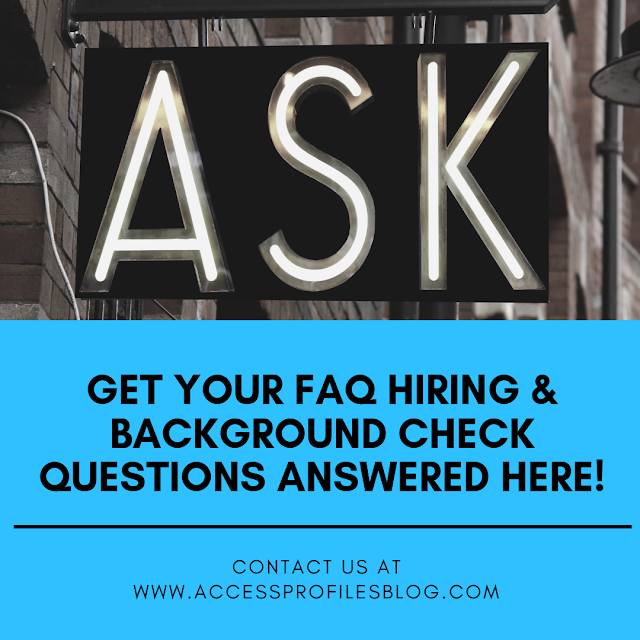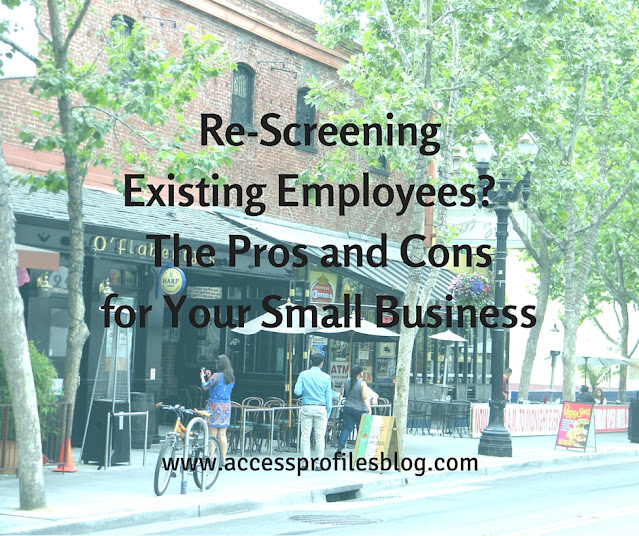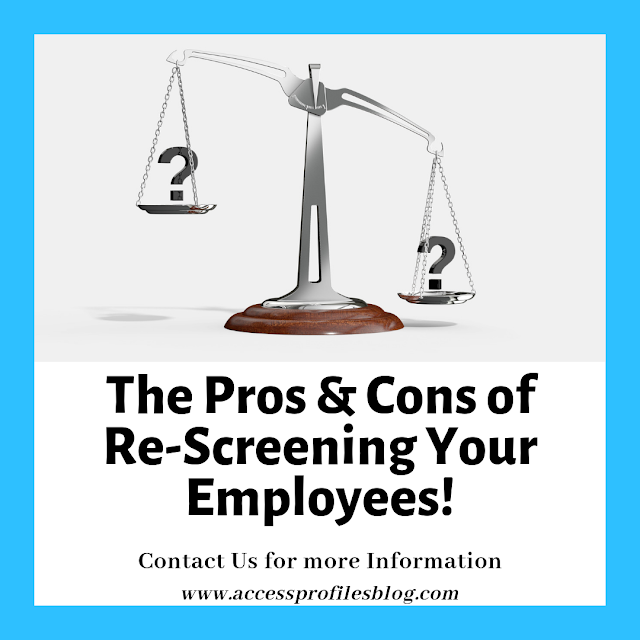 |
| Small Business Hiring Tips |
Are Your Company Job Descriptions all they should be?
By now you now know that creating a good job description is the first step towards finding the quality hire you need for your small business.It helps you discover exactly what skills and experience you need to fill your position. It will also help job seekers know if they will be a good fit with your company before they even apply!
You can discover more about what you need to include in a good job description in Part 1 of this series!
But the benefits of taking the time to do it right don’t stop there.
There are 2 more reasons Why a good Job Description is so important to your Small Business.
Good Job Descriptions Help Guide Your Small Business Hiring Decisions! “Tweet This”
2 Reasons a Good Job Description is Important to Your Small Business
Reason 1 ~ A Good Job Description Guides You During the Background Check Process.
When done right, your job description will help determine the scope of your background check. Knowing in advance exactly what is included in the job’s responsibilities is key.
You will need to consider the Level of your open position, whether the job includes access to company assets or sensitive customer/client data, and whether the position includes contact with customers and employees.
Determining this beforehand with a well-detailed job description will both help you decide what to check and keep you compliant with regulations concerning employment screening.
Read more about the link between Job Descriptions and Background Checks in “One Size Does Not Fit All! Why You Need to Fit the Background Check to the Job”!
Reason 2 ~ A Good Job Description Helps You Avoid Discrimination Claims
A good job description will help protect you and your small business against claims of discrimination, as long as it is clear about the job’s expectations and requirements. While there isn’t any legislation or rule that dictates you have job descriptions, the fact that they can help you avoid a costly lawsuit should be reason enough.
You need to be careful to avoid any potentially discriminatory or exclusionary wording in your job descriptions. Omit any gender specific phrases, such as “he will need to….” or age specific requirements. The key is not to write a job description that automatically excludes applicants in specific groups.
4 Red Flags to Avoid in Your Job Descriptions
EducationIf you require a certain level of education in your job description, you must be certain that it is necessary to performing the job duties.
EEOC (Equal Employment Opportunity Commission) guidelines make clear recommendations when it comes to education requirements in job descriptions. You should not set any education requirements at a level where they are more than what the job truly requires or they restrict applicants from any protected groups from being hired or possibly promoted.
For example, requiring that your applicants have a certain degree is discriminatory if it is truly not necessary to your job. Instead, you need to focus your job description on the skills your applicant must have to do the job.
Experience
Any job requirements you list that have to do with experience need to be completely job related and not discriminatory towards any protected group. Statements that require your applicants be within a specific age range or gender fall into this category.
If you intend to list requirements like these, you must be able to justify them as necessary for the job. However this is hard to prove, so I recommend you omit them and save yourself from being targeted in a discrimination lawsuit.
Language Skills
Unless your job duties include the need for fluent language skills, you should not include them in your job description. For example, stating that all applicants must have “good grammar”, even when the position is on an assembly line or as an overnight stock employee, is questionable.
However, if the position requires clear communication with other employees and customers (as in your sales department), listing the need for good language skills in your job description makes sense.
Physical Abilities
Job Descriptions can be an especially sensitive area when it comes to applicant’s with disabilities. According to the ADA (American’s with Disabilities Act), if an applicant/employee is capable of fulfilling your essential job functions with “reasonable accommodation”, then you should not discriminate against them when it comes to making a hiring decision.
And this needs to be addressed in your job description. Using terms such as “walk” or “talk” can be problematic. Instead, you can replace them with more non-discriminatory terms like “move” (in place of “walk”) or “communicate” (in place of “talk”).
However, if your position requires specific physical abilities, then these need to be specifically listed in your “necessary for business” job qualifications and “reasonably related” to your job.
What exactly does “reasonably related” mean?
According to the EEOC (*Source1) ~
Job descriptions “based on these protected characteristics (race, gender, age, religion, sexual orientation) are lawful only when an employer can demonstrate that they are bona fide occupational qualifications ("BFOQs") reasonably necessary to the normal operation of business. Otherwise stated, if a job description includes a requirement based on employee’s gender, national origin, religion, or age, all or substantially all of the individuals excluded from the requirement must be unable to safely and effectively perform the job duties which are reasonably necessary to the safe and efficient operation of the business.”.
Also frequently mentioned is the idea of “Business Necessity”.
What exactly is “Business Necessity”?
According to the SBA (Small Business Administration” (*Source2) ~
“Business Necessity” is defined as:
- A qualification necessary to the safe and efficient operation of the business
- A qualification where there are no alternatives or practices that would better or equally serve the same purpose without the discriminatory impact
- A qualification that effectively carries out the purpose it is supposed to serve
What this really means is that your job description qualifications show “business necessity” if they must be met in order for the job to be done safely and effectively.
However, if there are reasonable concessions or accommodations you can make that would allow someone who does not meet these qualifications to do the job, then the qualification you list is not a “business necessity”.
You need to realize that it is possible for your job descriptions to discriminate even when that is not your intention (and you can still be held liable for them).
What Should You Do?
Take a critical look at your job descriptions now! Make sure they do not, even marginally, include language that can be seen as discriminatory to anyone in a protected class (race, age, sex, national origin, or religion).When describing your job duties, be sure to stick with those that are completely necessary (as outlined in your necessary Skill Set), and avoid any generalizations. Be specific.
Following the tips in both Part 1 and Part 2 in this series will help you write the perfect Job Description for your Small Business. And, most importantly, it will help ensure you hire the best, and safest, candidate for your small business!
What are You waiting for?
Authored by

API can help you develop the best Job Descriptions for You and Make Sure You
Hire Right!
Hire Right!
 |
| Contact API for Help With Your Small Business Hiring |
Discover more About Us and our Background Investigation services too! And be sure to visit our
Resources and Frequently Asked Questions page for answers to some common hiring questions. Thanks!
*Source1 ~ Title VII and ADA: Hiring/Job Requirements/Job Descriptions
*Source2 ~ Writing Effective Job Descriptions via Small Business Administration














